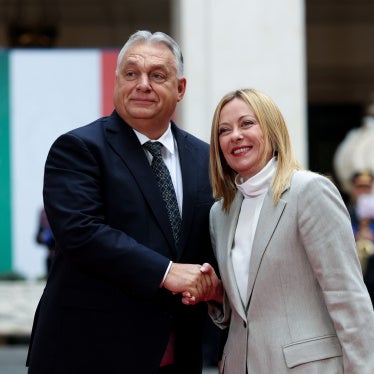A war-crimes trial reconvening in Belgrade district court on March 17 offers an important test of the rule of law in Serbia, Human Rights Watch said in a briefing paper issued today.
In the aftermath of the March 12 assassination of Serbian Prime Minister Zoran
Djindjic, Human Rights Watch underscored the importance of credible national efforts to hold war criminals accountable, some of whom are believed linked to the Djindjic murder.
The trial concerns four Serbs accused of kidnapping, torturing, and killing seventeen Muslims from Serbia on October 22, 1992. The case, often referred to as the “Sjeverin case,” after the town where most of the victims lived, commenced with an initial four days of hearings in late January. Human Rights Watch’s report is one in a series of “Balkans Justice Bulletins” aimed at assessing the efforts of national authorities to hold war criminals accountable. Serbia has to date held only four war-crime trials, but the Belgrade authorities have long argued that war criminals should be tried in national courts instead of before the International Criminal Tribunal for the former Yugoslavia (ICTY) in the Hague, an approach increasingly embraced by a number of other governments as well. The ICTY has said that it would like to try only senior-level war criminals, leaving trial of lower level perpetrators to the judiciaries in the region.
“Previous war-crime trials in Serbia and Montenegro have been few in number and seriously flawed,” said Elizabeth Andersen, executive director of the Europe and Central Asia Division of Human Rights Watch. “These cases are the litmus test for the rule of law in Serbia and Montenegro, an opportunity to break with the kind of horrible violence witnessed in Belgrade this week.”
Andersen said that in the first phase of the Sjeverin trial there were some positive signs, coupled with areas of continued concern that should be addressed as the trial reconvenes.
Human Rights Watch said that compared to past war-crime trials, the state prosecutor in this case seems to have assembled a stronger case, apparently benefiting from better cooperation from the Serbian police. Human Rights Watch cautioned, however, that this cooperation could be difficult to replicate in other war-crime cases that—in contrast to the Sjeverin case—implicate the police in the commission of the crime.
Among the positive aspects of the first phase of the trial, the president of the trial chamber asked a number of questions aimed at clarifying that the perpetrators were regular members of the Bosnian Serb army, not free-lancing paramilitaries.
Human Rights Watch also welcomed efforts by the court and prosecutor to protect vulnerable witnesses, but urged the development of a more systematic, properly funded witness protection program. The Criminal Procedure Act of Serbia and Montenegro contains only two very brief and general provisions addressing witness protection. Serbia does not have a witness protection program enabling witnesses, for example, to change identities, change residences, or arrange protection for family members. Even in trials not related to war crimes, the lack of witness protection often causes witnesses to alter their testimony at the trial.
Human Rights Watch said the first phase of the case had also highlighted serious gaps in cooperation between the authorities of Serbia and Montenegro and their counterparts in Bosnia and Herzegovina.
Two of the indictees, Dragutin Dragicevic and Djordje Sevic, pleaded not guilty on the opening day of the trial. The remaining two indictees, Milan Lukic and Oliver Krsmanovic, are believed to be at large in Bosnia, and are being tried in absentia by the Belgrade court. Lukic is also wanted by the ICTY.
Human Rights Watch said that trying Lukic and Krsmanovic in absentia raises concerns about their fair trial rights and pressed for the governments in the region to work together to bring them to account. Such efforts are complicated because Serbia and Montenegro and Bosnia and Herzegovina have no bilateral agreements governing judicial assistance in criminal matters.
Human Rights Watch called for an international arrest warrant to prevent the two from fleeing Bosnia, and also urged the Serbian court to request that the Bosnian authorities take over the prosecution of Krsmanovic and try him in accordance with international standards. At the same time, Human Rights Watch called on the authorities of the Republika Srpska (the majority Serbian entity of Bosnia) to arrest Lukic and transfer him to the ICTY. Andersen said that the authorities in Belgrade should also seek assistance from Bosnia and Herzegovina in obtaining testimony from Bosnian witnesses.
Human Rights Watch recommended a series of additional measures to improve the quality of the Sjeverin trial and other, future war-crime trials. These recommendations include:
- The court should endeavor to present the evidence in the trial in a manner that makes it as accessible to the general public as possible, consistent with the rights of the victims, witnesses, and the accused. In that context, the court should install a slide-projector or other mechanism for displaying photographic evidence in the courtroom;
- The staff of intergovernmental organizations and foreign embassies in Belgrade should monitor the hearings in the Sjeverin trial and other war-crime trials that might follow;
- The prosecution should seek all witnesses with information relating to the Sjeverin crime. These might include Serbs who witnessed the kidnapping; the only Muslim survivor; the commander of the brigade in the Bosnian Serb army to which the perpetrators belonged; civilians from Visegrad; the Serbian police and investigating judge from the Serbian town of Uzice, near the border with Bosnia, where Milan Lukic was arrested and subsequently released in October 1992 in relation to the incident; and municipal and police officials in Priboj, the Serbian town where the bus arrived after the kidnapping. The prosecution should present all relevant evidence so obtained to the court in the current trial, and bring any additional indictments this evidence might support.






